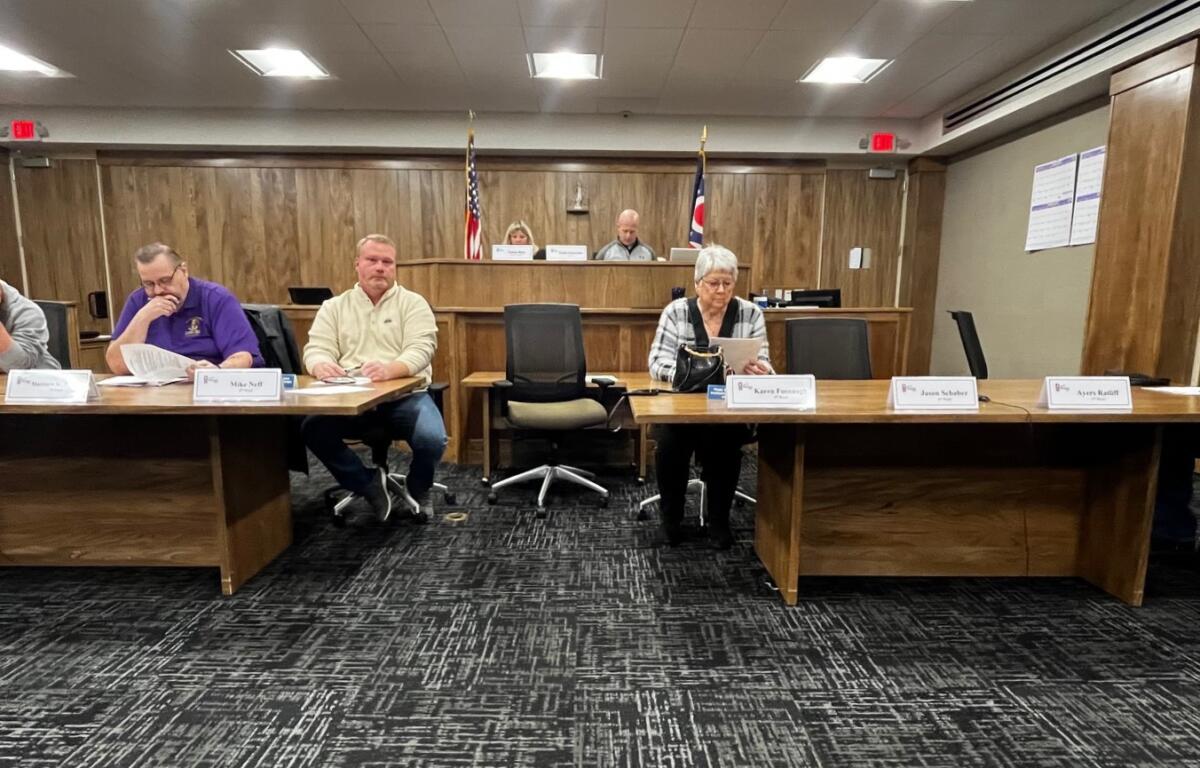MARION, OH (MARION COUNTY NOW)—Marion City Council failed in its attempt on Sunday to override Mayor Scott Schertzer’s vetoes of salary increases for three elected offices.
City councilors Mike Neff, 6th Ward, Karen Fosnaugh, 5th Ward, and Matthew Pollock, at-large, voted to schedule the special meeting on New Year’s Eve in hopes of reversing the mayor’s decision to veto ordinances that would have provided for salary increases for the auditor, law director, and mayor, effective Jan. 1, 2024. However, only five members of city council attended Sunday’s meeting. At least six members were needed to conduct a vote on the proposed override of the mayor’s vetoes.
Besides Neff, Fosnaugh, and Pollock, councilors Jeff Gerritsen, 1st Ward, and Aaron Rollins, at-large, were the only other members of Marion City Council who attended the meeting. Councilors Ayers Ratliff, 2nd Ward, Jason Schaber, 3rd Ward, Joshua Feliciano, 4th Ward, and Mike Thomas, at-large, did not attend the meeting. Schaber told Marion County Now on Friday that he had no intention of attending the meeting. Ratliff was on vacation.
Schertzer issued the three vetoes on Dec. 28, stating his belief that the proposed salary increases for the auditor, law director, and mayor “would place an undo burden on the General Fund for the City of Marion at a time when the city is in dire financial distress with the lack of accountability from the current Auditor (Miranda) Meginness and former Auditor (Robert) Landon.”
Had the veto override been successful, the auditor’s annual salary would have been increased to $80,000 from its current level of $64,900. The law director’s salary would have increased to $110,000 from its current level of $89,900. The mayor’s salary would have increased to $90,000 from its current level of $69,900.
Per terms of ordinances passed by city council in 2019, both the law director’s and mayor’s salaries will be increased effective Jan. 1, 2024. The law director’s salary will be $92,500 and the mayor’s salary will be $75,000. Those pay increases are set for the next term of each office, which runs from Jan. 1, 2024 through Dec. 31, 2027.
The auditor’s salary will remain at its current level from Jan. 1, 2024 through Dec. 31, 2027.
Neff said he was disappointed with the outcome of Sunday’s meeting.
“We were under the impression that we were going to have six members of city council here today, so it’s just disappointing that we didn’t get that,” Neff said. “I spoke to five of the six members who said they were going to be here and that were going to vote in the affirmative on (overriding) these three ordinances.”
Neff said not increasing the auditor’s salary “will make it very difficult” for Mayor-elect Bill Collins to find a replacement for Auditor Miranda Meginness, who is set to resign from office effective Jan. 5, 2024. Per Ohio Revised Code, because Meginness ran as an independent candidate in the November 2023 general election, the mayor has the task of appointing a replacement auditor.
In a heated moment during Sunday’s meeting, Collins accused the outgoing mayor Schertzer of “playing politics” by influencing Thomas not to attend the meeting.
“Mayor, did you make a stop at Mike Thomas’ house right before you came here to get him to stay home? I’m sure Marion people would like to know that,” Collins said.
Council President Todd Schneider declared that Collins was out of order in continuing to level accusations against Schertzer at which time Collins returned to his seat in the gallery.
Schertzer said his discussion with Thomas was “just good old fashioned lobbying.”
“I have no ill will towards anybody, regardless of what comments were made today,” Schertzer said. “The process worked the way the process was supposed to work. The State of Ohio has given statutory (city) mayors the ability to use the veto. I’ve done that a couple of times in my tenure. It has been overridden at least once that I can recall.
“I don’t take it personally – it’s the process. But when you start electing people who take things so personally, then we’re in trouble here. You have to respect the process. And the process in the legislative branch of government allows you to lobby one another. There’s nothing wrong with that.”
Schertzer further noted that “both sides were likely lobbying all nine voting members of city council to see what they were going to do.”
“If you’re going to call a special meeting, the first thing you do in legislative politics is make sure your votes show up and then make sure you have the votes to override (a veto),” Schertzer said. “This council has failed legislative politics 101. That’s just the way it goes.”
City of Marion elected officials were scheduled to be sworn in on New Year’s Day during a noon ceremony at City Hall. A reorganizational meeting was scheduled to follow that ceremony at which time city council would elect a clerk of council, president pro tempore of city council, and clerk pro tempore of city council. The 2024 city budget was also scheduled to be addressed.


